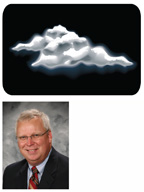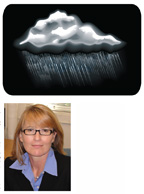
Joseph Haslag
Department of Economics, University of Missouri
Overall Forecast: HEAVY OVERCAST
He’s determined not to be the buzzkill at this party, so Joseph Haslag zeroes in on the positives coming out of an agonizing recession. During recessions, he said, “owners of capital and businesses seem to learn how to get by with fewer resources,” Haslag said. That, in turn, has led to increased productivity, which positions many companies for success in better times.
But… “some professional forecasters seem to be preparing themselves for a more buoyant 2011 than we had in 2010, and I would like to believe them,” Haslag said. “My hesitancy to jump on the bandwagon is that it’s hard to quantify how much of an uncertainty environment was created with this regulatory overhang”—and how that will translate in business decision-making. As a result, he expects “employment gains that are modest at best.”
Haslag’s chief concern is that, with the depth of regulatory change coming out of Washington over the past 18 months, he can’t yet say how business owners will respond moving forward. In other words, we may have internalized the concept of stagnation.
Two generators of more uncertainty in business decision-making, he said, were the continuing debate in Congress about the final regulatory reach of health-care reform, given the Republican takeover of the House this month, and the consumer-finance “protections” that pose immediate threats to the profitability of smaller community banks.
“But having a divided power structure is probably gong to retard the pace with some of the regulatory reforms” coming out of Washington,” he said. “That’s going to help.”
Extension of the Bush-era tax cuts provides some guidance for business owners, but the same issues will revisit us within two years, given the way the short leash Congress attached to them. Anyone pondering a high-return investment project, he said, is thinking “that I still run a risk that taxes will go up just as those returns start to be realized. On the margin, I think that affects how people behave.”
Therefore, he says of the tax-cut extensions, “I don’t think it will be a big spark.”
Among the biggest challenges, facing the economy, Haslag said, was the lack of incentives for banks to lend vigorously. “If I look at risk-free rates of return on treasuries, that’s still pretty low,” he said. “So if I’m a commercial bank, looking at that and low inflation, is holding cash—that doesn’t look like such a bad strategy until I see a real turn-around.”

Tracy Turner
Department of Economics, Kansas State University
Overall Forecast: FRONT APPROACHING
The country as a whole may still be mired in anemic recovery, but in ag-reliant Missouri and Kansas, things are looking good, says Tracy Turner. The Bush-era tax cut ex-tensions, will provide economic stimulus to boost capital markets and the long-term federal debt position. Closer to home, she says, export demand for agricultural and manufacturing products, plus high agricultural contract prices will remain strong through 2011, helping local communities.
Other factors, she said, had the region better-positioned to take advantage of an economic rebound. “Missouri and Kansas are faring far better than many other states,” Turner said. “Housing prices have been and continue to be stable in most communities. Regional foreclosure rates, although concentrated in some local communities, are still far below the national average. State personal income will continue to rebound in 2011, and Kansas and Missouri have among the lowest unemployment rates in the U.S.”
But … “If there is to be a dark cloud on the horizon, I expect that it is that the substantial reductions in federal stimulus dollars in 2011 will put increasing strain on state and local governments, leading to further reductions in government services, increased taxes or some of both,” she says.
Bigger questions remain with the impact of health-care and financial reform efforts approved in Congress last year; Republicans have vowed to make changes on both fronts. “Ultimately, what helps business growth on these two fronts is legislation that will slow the long-run growth in health care costs and ensure stable financial markets,” Turner said.

Randall Wray
Department of Economics, University of Missouri–KC
Overall Forecast: STORMS AHEAD
Randall Wray of UMKC minces no words: Among the biggest threats to economic recovery, he says, is what’s taking place in the financial system. “We know that fraud is rampant in the financial sector—particularly at the biggest banks,” Wray declares. “There is no doubt that they are ‘cooking the books.’ Another financial collapse is likely, although timing is impossible to project. All we need is a trigger.”
He looks for a tough 2011 for a number of other reasons, as well. “State and local governments are in terrible fiscal shape; they will be cutting spending and employment. That will affect the private sector.” The federal government’s newfound obsession with deficit-control, Wray says, “will kill growth—just as it did in 1937, when newly re-elected Franklin Roosevelt tried to make good on his campaign promise to reduce the deficit.”
Longer-term, the biggest drag on economic performance will remain what he calls rampant fraud in a “real-estate finance sector that is literally stealing homes and throwing Americans out onto the streets,” Wray said. “No recovery can begin until this stops and the frauds are brought to trial.”
None of which is to say he’s ready to jump off the highest building he can find on the UMKC campus. He cites as
one positive the pay-roll tax holiday that workers will enjoy throughout 2011. “That will put more money into the pockets of workers,” Wray says, but he sees almost all other actions as counter-productive. “Concerns with inflation and the budget deficit are preventing positive action coming from Washington,” Wray said. “It is all mis-
guided, but virtually inevitable. This looks a lot like 1932. We might be in Round 3 of a 9-round bout.”